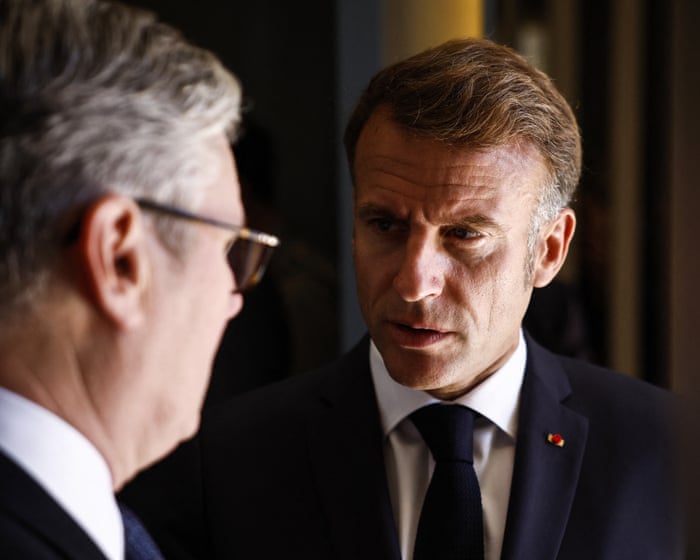Britain and France do not have a fixed amount of political stability between them, where calm in one country inevitably leads to turmoil in the other. It was simply a coincidence that Keir Starmer won a large majority last July, just as legislative elections left France ungovernable for Emmanuel Macron.
It was unfortunate for both leaders, and for Europe, that their political paths were misaligned. Macron had already dealt with four Conservative prime ministers before finding a potential ally in the rising Labour leader. By then, his presidency was in steep decline. Britain was emerging from the confusion of Brexit just as France was losing its way.
The two situations differ in scale. France’s parliamentary deadlock is a serious problem, while Britain’s departure from the EU was a massive disaster. Yet they are similar in that both were self-inflicted wounds, caused by arrogant leaders who overestimated their ability to persuade voters.
David Cameron called the 2016 referendum because he was sure he could charm voters into staying in the EU. Theresa May called an election in 2017 and lost the Conservative majority because she believed the country would reject Jeremy Corbyn’s Labour and give her a strong personal mandate to deliver Brexit.
Macron’s mistake combined elements of both errors. He dissolved the National Assembly last summer, thinking new elections would rally moderate voters against the far-right National Rally, which had done well in European elections. He was partly right—millions did mobilize to block the National Rally, but they ended up boosting left-wing parties hostile to the president.
In response, Macron tried to form governments from a weakened pool of centrist allies, ignoring parliamentary realities and the tradition that presidents respect the electorate’s choice when appointing a prime minister.
The result has been months of gridlock, protests, polarization, collapsing governments, blame, calls for new elections, and demands for Macron’s resignation. He has no plans to step down before his term ends in 2027, and in the meantime, he has little room to accomplish much. This mix of chaos and stagnation—where everything is in turmoil but nothing changes—recalls the rolling Brexit crisis in Parliament, which only ended in December 2019. By then, voters were so weary and disillusioned that they gave Boris Johnson free rein to finish the job as he saw fit.
In a French version of that story, the outcome could see Marine Le Pen, the National Rally’s former leader and longtime presidential candidate, enter the Élysée Palace. Or, if she is barred from running due to a conviction for embezzlement, it could be Jordan Bardella, the party’s polished, business-friendly millennial leader.
France and Britain are so different in their political systems and culture that comparisons often fall short. Yet for two neighboring nations with deeply intertwined histories, similar populations, and comparable economies, the lack of connection between their leaders is striking.
Then again, maybe it’s not so surprising. Proximity often breeds rivalry. French presidents and UK prime ministers usually find common ground in the end. Global cooperation tends to outweigh local competition, but agreements must be reached through a fog of mistrust, formed by centuries of unresolved friction.
For UK prime ministers, the relationship with the US has always been more comfortable. There has never been a partnership across the Channel like the Thatcher-Reagan alliance of the 1980s, or the inspiration Tony Blair drew from Bill Clinton’s New Democrats a decade later.
If their rises had been better timed, Macron and Starmer might have come close to such a partnership. Both see themselves as champions of pragmatic, liberal, center-ground politics, free from the rigid ideologies of left and right.Both leaders are on a mission to counter the growing influence of demagoguery and nationalism. They reached the top of their political systems with relatively little experience in government or party politics. Macron became president at 39, bypassing the traditional French path of serving as a mayor or in senior ministries. Starmer was 61 when he became prime minister, having been an MP for just nine years and never holding a government role.
With backgrounds in finance and law, neither man is an outsider, but they aren’t typical politicians either, having grown up outside the political jungle they now dominate. As a result, they missed learning some of the survival skills and group dynamics essential in politics.
Macron’s arrogance is more striking than Starmer’s quiet confidence, but both have made unnecessary enemies by failing to build alliances beyond their inner circles. Their personal relationship is described as warm and open, though not particularly electric. (Only close friends and family get that level of connection with the Labour leader.)
Their styles differ greatly. At his peak, Macron possessed a magnetic eloquence that Starmer lacks. No one has ever accused the British prime minister of soaring rhetoric or deep geopolitical analysis about Europe’s future—that’s Macron’s forte.
Still, they can work together on issues like Ukraine, broader security and defense cooperation, and illegal migration. Critics may nitpick the details, but these agreements build trust.
Relations have improved without the hostile tabloid leaks and historical jabs that were common when the Tories felt Paris was uncooperative. It turns out diplomacy works better without childish references to Agincourt.
Moving past pointless Brexit rhetoric helps, but there are limits to cooperation between an EU member and a “third country.” Starmer hasn’t clearly defined Britain’s future relationship with its neighbors, failing to capture Macron’s interest in what EU policymakers call the “variable geometry” of Europe.
Starmer came to power with cautious, vague pro-European goals, while Macron, who might have welcomed bolder ideas, was already weakened by domestic challenges. Hopes for a special Franco-British partnership to strengthen Europe remain a fantasy.
In reality, comparing Macronism and Starmerism reveals a tragedy of missed opportunities—two leaders who seized the center ground but failed to build anything lasting. Macron is now besieged by radical forces on the left and right, who despise him despite their mutual hatred. He leaves no legacy for a successor to defend; his endorsement might even harm a candidate. The call to defend the Republic against the far right has been repeated with diminishing effect.The law of diminishing returns applies to successive elections. The far-right has long been part of the mainstream. It now moves freely in parliament, convincing more and more French voters and business leaders that it has been tamed—that it is no longer the dangerous force from cautionary tales. It claims that the real danger to democracy and the economy comes from the left.
Nigel Farage and his allies in Britain are observing and learning. They see how opposition is gradually worn away. They watch support for the liberal center fade because it only finds its voice in a last-minute panic of self-preservation. They understand how to portray moderate, practical government as weak and corrupt, defending an outdated status quo. That is the trap being laid for Keir Starmer. By studying Macron’s fate, he might learn to avoid stepping right into it.
Rafael Behr is a Guardian columnist.
Frequently Asked Questions
Of course Here is a list of FAQs about the topic framed in a natural conversational tone with clear and concise answers
General Beginner Questions
1 What is this article about
Its about how the political difficulties faced by French President Emmanuel Macron can be a warning for the UKs Labour leader Keir Starmer as he prepares for a potential term in government
2 Who is Rafael Behr
Rafael Behr is a wellknown political journalist and columnist for The Guardian newspaper who often writes about UK and European politics
3 What turmoil is Emmanuel Macron facing
Hes dealing with widespread public protests a loss of his parliamentary majority and a rise in support for farright parties making it very difficult for him to pass his policies
4 Why would this be a cautionary tale for Keir Starmer
Because Starmer like Macron might win power but without a strong mandate or a united country making it hard to deliver on his promises and avoid public backlash
Deeper Analysis Advanced Questions
5 What are the main parallels between Macron and Starmers situations
Both are seen as centrist figures who may win an election not necessarily because of overwhelming public enthusiasm for their projects but because voters are rejecting the alternative
6 What specific lesson should Starmer learn from Macrons experience
The lesson is that winning an election is just the beginning He must manage public expectations build broad coalitions for support and avoid appearing out of touch with the everyday struggles of voters
7 What is the risk of a honeymoon period ending quickly
This is a key risk A new leader can enjoy a period of public goodwill but if they fail to deliver tangible results quickly or face early political missteps public and media opinion can turn against them rapidly as happened with Macron
8 How could a large majority in Parliament actually be a problem for Starmer
It might seem counterintuitive but a large majority can lead to complacency and make a leader less willing to compromise or listen to dissenting voices This can create an aloof image and alienate the very voters who brought them to power
9 What is the Macron trap that commentators refer to
The Macron trap is the danger of a centist leader



